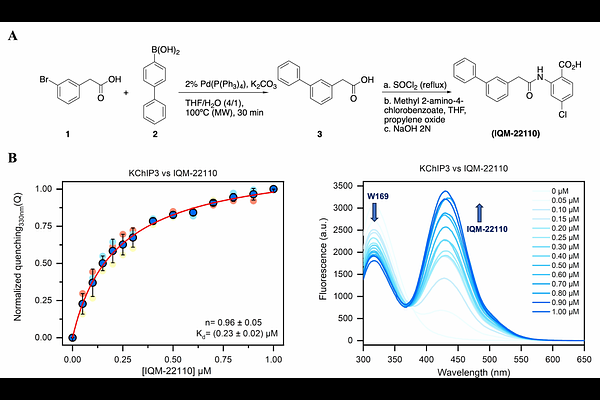IQM-22110 as a selective KV4.3/KChIP3 modulator. Molecular determinants of the KChIP3 binding site

IQM-22110 as a selective KV4.3/KChIP3 modulator. Molecular determinants of the KChIP3 binding site
Socuellamos, P. G.; Viedma-Barba, C.; de Benito-Bueno, A.; Bonache, M. A.; Ropero, M.; Diez, S.; Elizalde, P.; Marin-Olivero, I.; Redondo-Moya, M.; Naranjo, J. R.; Gonzalez-Vera, J. A.; Orte, A.; Perez-Lara, A.; Martin-Martinez, M.; Valenzuela, C.; Gutierrez-Rodriguez, M.
AbstractThe goal of the present study was to discover novel KChIP ligands as research tools for modulating the KV4.3/KChIP channels. By employing a multidisciplinary approach, combining medicinal chemistry and electrophysiology studies, a novel KV4.3/KChIP modulator (IQM-22110) was successfully identified. IQM-22110 has emerged from the combination of our prior knowledge regarding the (phenylacetamido)benzoic acid moiety as an effective scaffold for KChIP3 ligands and a virtual screening of a focused chemical library. Guided by docking studies, which indicated that incorporating an additional aromatic ring could enhance binding affinity, IQM-22110 was selected for synthesis and identified as a potent KChIP3 ligand. Its electrophysiological effects on KV4.3/KChIP3 currents indicate that IQM-22110 binds to a high affinity site in KV4.3/KChIP3 channels that it is not present in KV4.3/KChIP2 or KV4.3. To the best of our knowledge, here we describe the first KChIP3 ligand that selectively modulates KV4.3/KChIP3 versus KV4.3/KChIP2 and KV4.3 alone channels. Given that KChIP2 is primarily expressed in heart, our findings might pave the way for the development of KV4.3/KChIP3 blockers with reduced cardiac side effects. Computational and site-directed mutagenesis studies allowed the identification of IQM-22110\'s binding site on KChIP3. Knowledge gained from our structural and functional studies with this novel KChIP3 ligand could establish the basis for drug discovery programs fostering treatments for diseases in which KV4.3/KChIPs channels are involved.